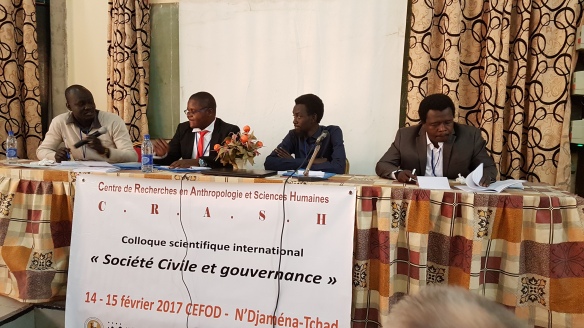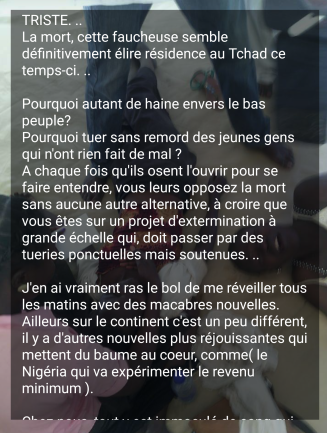
N’djaména, discussing possibilities of civil society @Mirjam
I returned from Chad on 19 February. I had been attending a conference on governance and citizenship organized by CRASH (Centre for Research in Anthropology and the Humanities). CRASH is a free space for research, as was shown also during the conference: there were discussions about civil society, the protests, state responses and the crisis that Chad has found itself in since the elections of April 2016. This was daring, for the situation in Chad is tense.
Crisis
Since August 2016, when I also visited Chad, things had changed quite a bit. The crisis had really settled in the country. Internet, then already cut for three months, was only back by the end of December 2016. After a long period without salary, December ending was the moment of payment, but most people received only half of what they used to (no primes). People could celebrate the New Year, but still, things were bad for all the families I visited. Visible in the streets: economic activity low, bars empty, and the stories were also clear. As negotiations with the unions opened, some people expressed their hope that this would help. But their hope seems in vain as there are deeper layers to the crisis, and the actions of the government are deepening emotions of loss. Back in the Netherlands after a week I heard that the students were resuming their strike.
Visit to Toukra, university campus
 On Wednesday 1 March, I was shocked by the posts on Facebook about the killing of children in a school in Walia, a southern quarter of N’Djamena; shot by police forces because they were protesting against the arrest on 28 February of 69 young people who were suspected of creating chaos during a campus visit of the Ministre de l’enseignement superieur (Minister of Higher Education) and his Senegalese colleague (25 February); already for a few months the students had protested regularly a.o. against the retreat of their stipends. One form of protest is the molest of government cars; as a student explained to me, this is their only way to express a voice for change. My friends in their thirties remembered this had been their acts as well when they were in college, two decades ago. Arresting these youngsters is not necessary, condemning them even for terrorist acts is worse. On 1 March, the 69 students were condemned for 1 month closed detention for outrage à l’autorité de l’Etat, plus each a ransom of 75 Euros.
On Wednesday 1 March, I was shocked by the posts on Facebook about the killing of children in a school in Walia, a southern quarter of N’Djamena; shot by police forces because they were protesting against the arrest on 28 February of 69 young people who were suspected of creating chaos during a campus visit of the Ministre de l’enseignement superieur (Minister of Higher Education) and his Senegalese colleague (25 February); already for a few months the students had protested regularly a.o. against the retreat of their stipends. One form of protest is the molest of government cars; as a student explained to me, this is their only way to express a voice for change. My friends in their thirties remembered this had been their acts as well when they were in college, two decades ago. Arresting these youngsters is not necessary, condemning them even for terrorist acts is worse. On 1 March, the 69 students were condemned for 1 month closed detention for outrage à l’autorité de l’Etat, plus each a ransom of 75 Euros.
Conflict at school: closure
On 10 February, just before I arrived in N’Djamena on the 12th, in Mongo, a city in central Chad, children were killed as well. A friend from Mongo witnessed what was happening. He came to see me in N’Djamena and told me his interpretation of the events: A conflict between two girls from different ethnic groups and one prejoratively insulting the other, became a bigger fight. The police went in and shot with real bullets; one child dead, others wounded. When the corpse was released from the hospital, the college children (lycée) grabbed the corpse and carried it to the military camp, to give it to the person who killed the child. The forces turned out again and killed another child and wounded more. The wounded are in the hospital in N’Djamena as the hospital in Mongo does not have the capacity to help them; the children are buried, schools are closed, no action from the ministers or government to calm the situation except repression. Other versions have been told: in an article of RFI it was related that the shooting was done by the son of one of the generals; however, the fact of the two deaths and many wounded is verified. The stories circulate and will not stop to divide the population.
Whose rights?
These children simply ask for their rights, but they are denied citizenship by their government. The conclusion of the CRASH conference about the difficulties of civil society in Chad are an everyday reality. And even worse: those who deserve citizenship are being killed.
L’UNESCO s’est trompée. Le Tchad a 70 ans de retard sur le plan educative? Donc en 1947? Trop peu. Si c’est 1947 d’un autre pays africain, le tchad est en 100 ans de retard. (text from FB post, 27-2-2017)
The story does not stop here: this academic year will be an année blanche at the university – no stipends, and no teachers to teach; a university complex that has no electricity, nor internet connection, and education systems that are rated 70 years behind. The children in this education system protest and are killed. At the same moment, the chique hotels of N’Djamena receive the ‘salon d’étudiants d’Afrique’ (23-25 February) organized by a son of President Idriss Déby, who recently returned from France where he studied, and his friend. The guests that come from all over Africa are hosted without limits on expenditure.
Pendant trois jours, du 23 au 25 février 2017, les jeunes Africains auront l’occasion de rencontrer, directement, sur place, au palais du 15 janvier de N’Djamena, des responsables des prestigieuses écoles, universités ou instituts de formations africaines.
Although it is a good initiative, in principle, comments heard in N’Djamena are critical. ‘The country is in crisis and then these elites dare to spend all this money on the happy few’. In an interview the organiser replies to these critiques:
The doors are open for the poor students from Chad who suffer from the crisis.
He does not realize how this remark summarizes the ugly contrasts in Chad!
